From fintech to foodtech solutions; from beauty brands to biotech infusions, FORBES AFRICA’s inaugural list of Small Giants across Africa showcases the tenacity of homegrown businesses and their impact on the communities they serve. Their pan-African CEO-founders and leaders are making giant strides in progressing Africa’s growth narrative, prioritizing ideas and innovation.
Art Direction: Manelisi Dabata
Photography: Katlego Mokubyane ; Assistant: Sbusiso Sigidi | Studio: NewKatz Studio, Johannesburg Styling: Deneal Van Wyk
Hair & Makeup: SnehhOnline Beauty
The mark of a good business often relies on three Ps: profit, people and planet. It’s hard to say which ‘P’ should be prioritized but as the companies on our first cohort of impactful Small Giants will attest, people, be they employees, managers or customers, can make all the difference. Second to that is the ‘proudly African’ thread that has been woven through each of these businesses. The Small Giants are the businesses that believe small is better, and purpose as important as profit, and most times, even more. They are drawn from the Small and Medium Enterprises (SME) sector in Africa that’s a sizeable mass, incorporated in the formal and informal economies.
In the 2023 Mastercard SME Confidence Index, the World Bank notes that SMEs account for 60% of jobs in Africa. However, they operate in cash-based economies and face a $330 billion financing gap. A 2022 African Union Development Agency report supports this, indicating that SMEs account for closer to 80% of jobs in Africa. These statistics reinforce SMEs as a significant mechanism for socio-economic growth.
StatsSA reported that industries in South Africa’s formal business sector, in particular, generated ZAR10.5 trillion ($677.42 billion) in total turnover in the 2019 financial year. The report further stipulated that the breakdown of turnover by business size shows that small businesses were responsible for generating ZAR2.3 trillion ($148.39 billion) of the ZAR10.5 trillion.
Loading...
To complement our research in compiling this list, we spoke to several of these small businesses, and a significant aspect of the discussion to determine scale revolved around financial revenues, but unsurprisingly, there was a common reluctance among the majority of the firms to share this data.
Carl Wazen, co-founder and Chief Business Officer at Yoco, a growing fintech company in South Africa, reasons that this could have to do with companies “keeping their heads down and focusing, and not having a lot of time to make a noise”, whilst the other aspect is cultural.
“You have different cultural nuances [in Africa],” Wazen says, also alluding to the more mature markets such as the United States (U.S.) where this may not be so. “The U.S. is a lot more comfortable talking about money or talking about milestones, whereas, in Europe, money is maybe more taboo there than it is in the U.S.”
Andrew Amoils, Head of Research at New World Wealth, a South Africa-based global wealth intelligence firm, offers another view, indicating that most of the time, no matter where, people are not quite open about speaking about their billions or millions.
“It’s not unique to Africa,” Amoils says. “I guess some people feel like you’re kind of putting a target on [their] back and [that] can affect the way they [talk about money]… only a few countries (the U.S., United Kingdom and Australia) have pretty transparent information.”
For those looking, there are enough studies and reports indicating the actual picture of wealth on the African continent. The total investable wealth currently held in Africa amounts to $2.5 trillion and its millionaire population is set to rise by 65% over the next 10 years, ac-cording to the 2024 Africa Wealth Report, published by international wealth advisory firm, Henley & Partners.
“Future growth should [be] fueled by strong growth in fast-growing sectors such as fintech, eco-tourism, business process outsourcing, software development, rare metals mining, green tech, media and entertainment, and wealth management,” Amoils adds.
There has been global advancement in fostering gender diversity within leadership roles. However, when determining and understanding the spaces taken up by the titans in small business, FORBES AFRICA’s research led to more male founders, leaders, and C-suite executives, hence the preponderance of one gender over the other in our list of Africa’s Small Giants. This shows that progress comes with caveats. LinkedIn’s 2024 data indicates that the representation of women drops to 25% in C-suite positions on average, compared to 46% in entry-level positions.
The World Economic Forum reported in 2023 that women constitute 58% of self-employment across Africa, and contribute approximately 13% of Africa’s total GDP. However, many women still find themselves working a lot harder to be heard or seen by potential investors as well as colleagues. The female powerhouses on our inaugural Small Giants list attest to this reality, hands down.
“Being a woman in business, in general, is quite difficult,” says Tasneem Karodia, the co-founder and Chief Operating Officer at Newform Foods. “I come from a career in corporate, and that has its own challenges. I started quite young working in consulting, and had to be faced with a lot of top executives from big companies.”
“I’m an entrepreneur, and I don’t really take no for an answer,” offers Delia Stirling, founder of Grove and Meadow and Commercial Director at Brown’s Food Company. “I just wouldn’t tolerate somebody not working with me because I [am] a woman. I think it’s that perseverance that you have to have… When I work with anybody, they can feel the passion and understand where I’m coming from.”
“I was very used to being the only woman at the table,” Claire Blanckenberg, founder and CEO, Reel Gardening, tells FORBES AFRICA. “And I just kind of put my head down and claimed my seat at the table without asking for permission.” What remains steadfast as a theme on this list is the priority to showcase businesses that are African, with a proudly African mindset.
From a community-focused food-processing company or a sneaker brand that is uniquely recognizable for its mesh material to a female-led enterprise known globally as a pioneer in the tea industry, these businesses are small in scale but big on ideas and impact. For these businesses, it’s not about reaching three-comma numbers when it comes to revenues or fortunes, but rather, about honoring their unflinching belief that success can have a whole different definition in creating meaningful futures, for all.
METHODOLOGY
Africa is rich with opportunities and possibilities, as evidenced by this list, which is but only a small representation or subset of the growing, thriving small business sector on the continent. From across Africa, the FORBES AFRICA editorial team looked at businesses that were at least five years old this year, were privately-held, had sound business models and were profitable. Our research led us to finding the local heroes in their communities. We called for nominations, which gave founders an opportunity to put forth the names of their enterprises. To gain deeper insight into their impact-driven models, we interviewed the founders/directors/CEOs with one key question: what makes your business homegrown and proudly African? To determine their scale of success, we looked at metrics such as self-preservation, sustainability, community engagement, innovation and value-creation. While this unranked list of 25 local businesses captures the versatility of industries on the continent, purpose remains a common priority for each of these Small Giants.
Editor’s Note: The list on these pages follows no particular order.
Mukuru
Southern Africa • Founded: 2004
CEO: Andy Jury
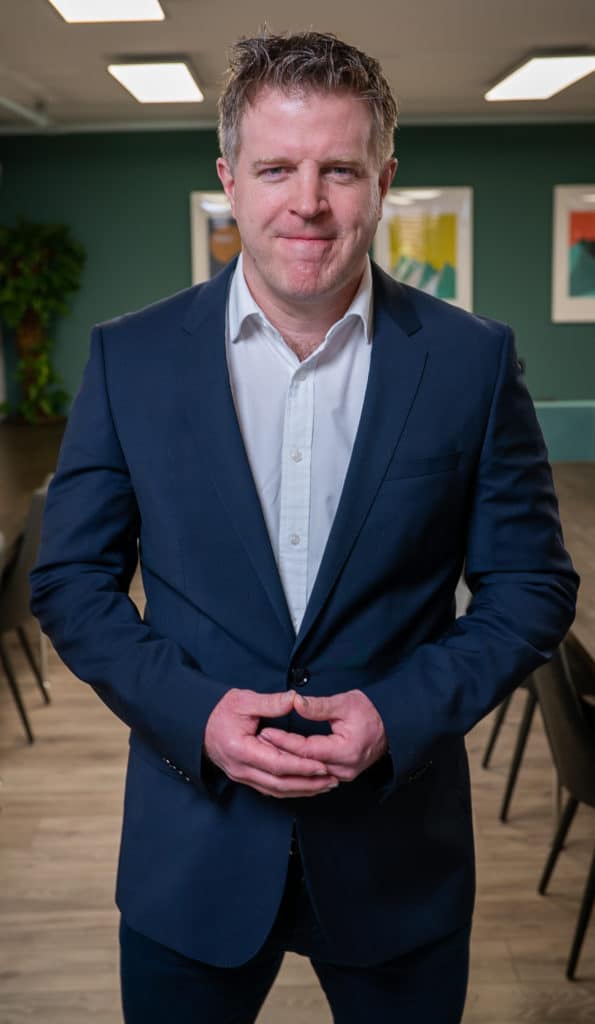
Fintech companies are on the rise in Africa, and it is a space that Andy Jury finds incredibly exciting.
Over rounds of beer and biltong with the founders of Mukuru, Jury con- cluded that participating in this sphere could greatly benefit Africa’s development.
“We pride ourselves in being an African business that has an Afri-can-do spirit that is looking to solve the challenges that the vast majority of Africans across the continent feel today, and leverage the opportunities that come with that,” he tells FORBES AFRICA.
Mukuru has a customer base of over 13 million across Africa, Asia, and Europe. With over 100 million transactions to date, the company, whose core was built providing international money transfers, has developed a set of services to address the extensive financial needs of its customers.
“We essentially originated as bridging borders and fueling dreams, and allowing people to move money between two locations,” Jury says.
“I think what is amazing, is Africa naturally provides you with massive reser- voirs of resilience. And so there’s always this sort of African ingenuity to solving a problem.”
When it comes to financial inclusion, Jury believes it’s important to look at what the customer wants, to help solve the problem.
“We’ve spent time walking in our customers’ shoes, watching how they engage with each other and how they send money in an informal environment and then tried to say, ‘how can we layer over simple easy-to-use-readily-available-in-their- everyday-context technology that our customers are familiar with’,” he says.
“[In doing this, we are enabling] the sort of theories that are [looking at] small but continuous changes made in their lives, such that they benefit from the value chain of digitization, but also for more financial inclusion.”
YOCO
South Africa • Founded: 2013
Co-founder and Chief Business Officer:
Carl Wazen
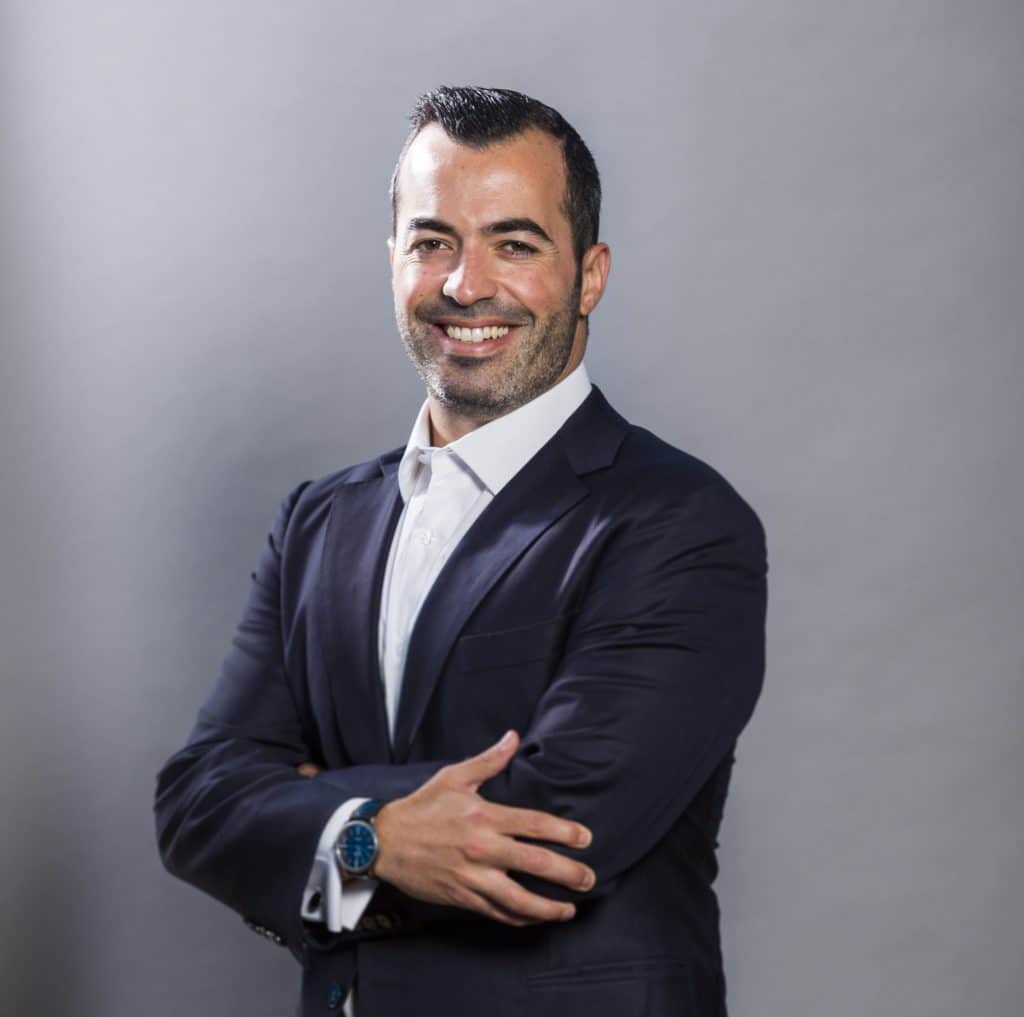
As the co-founder of Yoco, Carl Wazen has witnessed how their ubiquitous smart card machines have helped African SMEs.
“An important thing to understand is that the core of Yoco’s innovation, from the outset, has been around access,” he says.
“Access and this payment gap being one of them, because there was [only] one out of 10 businesses that accepted cards. And therefore, 90% of the market was previously excluded. We really focused our efforts on closing that gap and solving a range of things that needed to be solved.”
Yoco has secured over $100 million in funding from top-tier global investors, solidifying its posi- tion as a key player in the fintech industry. Wazen, along with his three co-founders, have always sought to play a pivotal role in delivering impactful solutions to small businesses.
“We just didn’t feel like there were a lot of prod- ucts being built for small businesses,” Wazen says. “And we thought we had an opportunity to build products, but also tell their stories. [We have] built a narrative around underdogs, around bravery, and around entrepreneurship being a very noble pursuit.”
Onafriq
South Africa/Pan-African • Founded: 2010
Founder and CEO: Dare Okoudjou
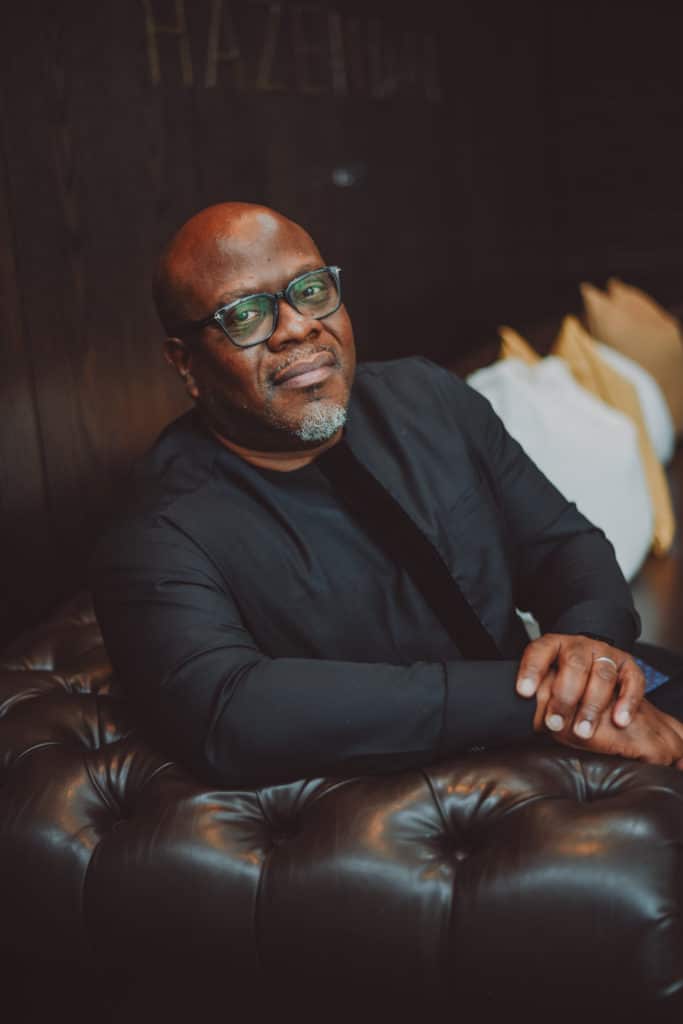
As the leading digital payments network on the continent, Onafriq (previously MFS Africa) has a pan-African and multi- cultural approach. With presence in around 40 different countries, Dare Okoudjou’s Onafriq is driven to create access for Africans to a borderless world. The fintech connects over 500 million mobile money wallets across these African markets.
“Our mission to open up a world without borders for countless Africans and their businesses, is deeply personal to us,” Okoudjou tells FORBES AFRICA.
“It’s born from a profound belief in the power of access.”
The company’s new name is around the idea of One Africa – an interconnected borderless continent where access unlocks greater potential. Their reach in trying to assist SMEs across the continent led to them partnering with multinational payment card services corporation, Mastercard, in April.
“We know that for a continent as rich and varied as Africa, hav- ing access to financial services is more than just a convenience — it’s essential. It’s about giving people and businesses the keys to unlock
their full potential, allowing them to join the global economy, and spark economic development,” Okoudjou says.
At its core, Onafriq celebrates being homegrown and African be- cause of its focus zeroing in on challenges and opportunities unique to Africa. Okoudjou adds that it’s also about his leadership and team being based in Africa and dedicating significant portions of their careers to addressing and solving African challenges.
“When you put all these elements together, it’s clear that Onafriq isn’t just in Africa — it’s of Africa. It reflects a deep-seated commit- ment to not just doing business on the continent but being a part of its growth, challenges, and opportunities. And that’s what makes it truly homegrown and African,” he adds.
EskomSePush
South Africa • Founded: 2014
Founders: Herman Maritz and Dan Southwood-Wells
South Africa has been known for its infamous power outages for well over a decade now, even officially reaching Stage 6 (several hours of loadshedding on a given day) in recent years. For many South Africans, staying up-to-date about these rolling blackouts has been made easier by an app, EskomSePush.
Back in 2014, founders Dan Southwood-Wells and Herman Maritz worked together at a banking company, building apps.
One particular afternoon, the power was out again and they were unsure about whether to brave the heavy traffic for their commute home. “It was about trying to figure out that if we went home now, would we have loadshedding? So, we were trying to plan around it,” Southwood-Wells says. “And then Herman was like, ‘can’t we just build something that will send us a message when there is no power’?”
They did, and their app has reportedly reached over seven million users in South Africa.
“ ‘Information is power’ has always been our mission,” Southwood- Wells adds. “What we’ve learned through loadshedding is that if you can give someone the right information, at the right time, and it’s accurate, then they can plan for their lives, for their community, for their family, for the company, and they can move around. Don’t get me wrong, just like any other South African, we don’t like loadshedding. But we can help in that situation.”
BATHU
South Africa Founded: 2015
Founder and CEO: Theo Baloyi

Theo Baloyi literally walks the talk. At the NewKatz.Studio in Johannesburg, South Africa, where he strides in for an interview, the founder of Bathu tells us more about one of the country’s much-loved sneaker brands. It started when Baloyi was still an accountant and concerned about his community, more so, every time he would go home to Alexandra, a sprawling township in Johannesburg.
“I would realize that a lot of people in my community are unemployed, and pre-dominantly, the youth… they’ve lost hope as well. When I went back to the people — those who have given me opportunities and have paved the way for me — to ex-press my gratitude, it was met by one big ask [from them]; ‘we don’t want anything from you, just pave the way for others’.’”
At the time, Baloyi, the self-proclaimed “sneakerhead”, had bought himself sev-eral pairs of sneakers, which led him to a particular philosophy. “They say when you buy too much of something, why not own it or become part of the value chain?”
Baloyi says.When he launched Bathu in 2015, he only sold about 100 pairs. Today, the company sells 250,000 pairs of sneakers a year with 32 stores nationwide and a staff complement of over 300 employ-ees, many of whom are today’s youth.
“We are a footwear brand and a shoe business with a soul,” Baloyi says. “And why I say that is because I feel as though we go back into investing in our future consumers, so not necessarily someone who can buy Bathu today… someone who doesn’t know their journey yet. They don’t know their dreams or purpose yet. And we believe in walking the journey not only with our current consumers but with our future consumers as well.”
Skin Gourmet
Ghana • Founded: 2014
Founder and CEO: Violet Awo Amoabeng
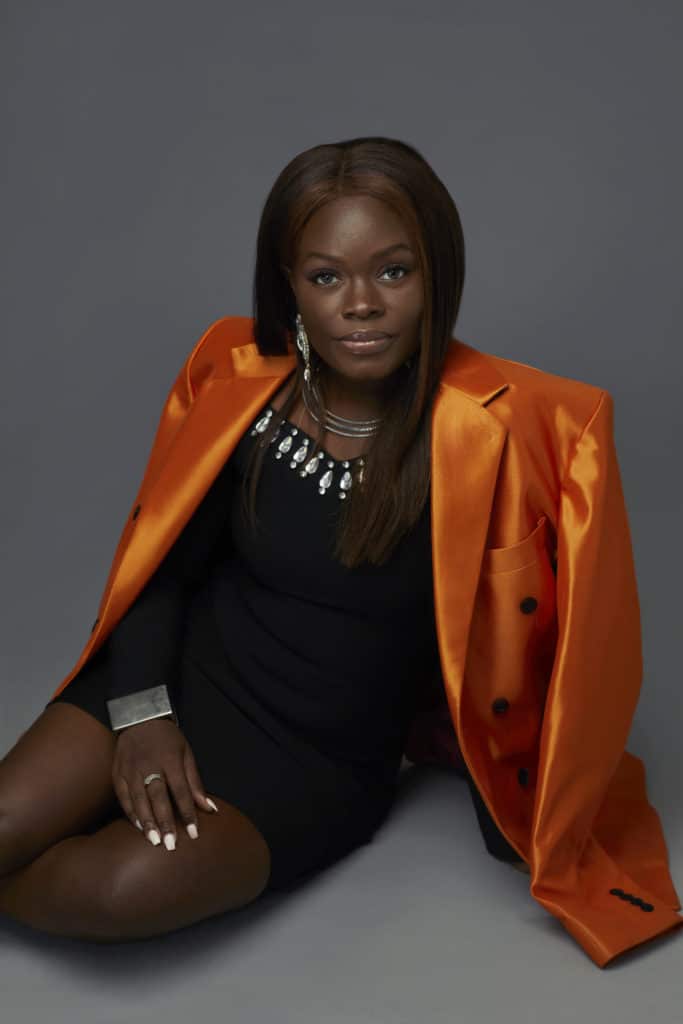
In the skincare industry, where trends come and go, Skin Gourmet stands out not just for its products, but for the integration of tradi- tion, safety and social impact.
The company, founded by Violet Awo Amoabeng, has carved a niche in the beauty industry by blending age-old practices with modern inno- vation, while making a tangible difference in communities across Africa.
Amoabeng reflects on the journey of building it from the ground up. “Starting Skin Gourmet with just $45 was a journey marked by significant challenges and milestones that shaped our path to where we are today,” she says.
These milestones included being a finalist in the Africa Business He- roes competition and winning the Best Innovative Response Strategy to Covid-19 in 2020 at the Ghana Makeup Awards.
She says that Skin Gourmet crafts products so safe that they are ed- ible, aligning with the belief that skincare should enhance health, not compromise it. Beyond safety, Skin Gourmet’s social impact activities, she says, extend to every aspect of its operations, from sustainable sourcing to workforce development.
“Skin Gourmet envisions a pivotal role in driving positive change and promoting sustainable development across Africa,” says Amoabeng of the company’s vision.
Legends Barbershop
South Africa • Founded: 2011
Founder and CEO: Sheldon Tatchell
Sheldon Tatchell’s journey began on a stoep (veranda in front of a house) with nothing but a clipper, a chair, and a dream. “Coming from a community like Eldorado Park [a suburb in Johannesburg], the barber is the go-to guy, he’s a superhero purely [because] he has the power to make you look good and feel good about yourself,” explains Tatchell. “As a kid, that was a person I aspired to be.”

With that determined spirit, Tatchell has been able to open over 50 Legends Barbershop stores and boasts more than 600 staff members across five countries, namely South Africa, Lesotho, Zambia, Namibia, and Botswana.
Taking his business a step further, Tatchell also sells a line of Legend Barbershop products in some of South Africa’s biggest retail stores such as Clicks and Dischem.
“The advice I would give to anybody is to have hope that you can do it. If Sheldon can do it, so can you,” he says.
“I wasn’t the most talented, I wasn’t the most skilled, I don’t have a degree, I don’t have any of the qualifications in this position.
PORTIA SKIN SOLUTIONS
South Africa • Founded: 2011
Founder and CEO: Portia Mngomezulu

It’s just being able to say I’m humble enough to take on what I’ve learned, to never to look down on people and always just take learnings as they come. But, for me, it started with hope!”
The inspiration [for the brand] started with me [being] a woman in South Africa, and Africa, who uses beauty products,” says Portia Mngomezulu when we meet in Johannesburg for a photoshoot and interview.
“I wanted to create a product that not only is a cosmetic product, but that gives our skin results and with ingredients that will resonate with Africans.”
When Mngomezulu gave birth to her son, she developed stretch marks that she couldn’t get rid of. Despite attempting various store remedies, she ultimately followed her grandmother’s advice and turned to Marula oil.
“I thought, as a woman, let me go and try something that is traditionally African… this African herb. I went ahead and tried the oil [and] it worked miraculously on my stretch marks. I started ‘inboxing’ my friends about the secret that I found, bottling it and selling it for ZAR100 [$5.42].”
For Mngomezulu, it was about finding local solutions for African women.
“I honestly believe that we are homegrown,” Mngomezulu says. “Our skin is different, our climate is different. So, we need tailor-made products for our skin that are tested here with our climate, with our skin conditions. I believe that the products that are imported are not made for our skin.”
She never expected her brand to become a nationwide success, but with products that are available in over 4,000 stores in South Africa and across over 14 African countries, Mngomezulu truly believes that hers is a proudly African brand.
Her company’s revenue is ZAR250 million ($13.7 million) a year.
Reliance Health
Nigeria • Founded: 2016
Founders: Femi Kuti, Opeyemi Olumekun and Matthew Mayaki
In a world where technology is reshaping industries at lightning speed, few sectors stand to benefit as profoundly as healthcare.

Reliance Health is redefining how Nigerians access medical care. Femi Kuti, the co-founder and CEO of the company, which focuses on building an integrated healthcare system, traces it roots to Kangpe Health, a telemedicine platform founded in 2015.
Since its inception, the startup has made technology accessibility a cornerstone of its mission.
“Tech for accessibility has never been an afterthought — it’s founda- tional to how we operate,” says Kuti.
Through the app, users can consult with doctors from the comfort of their homes or offices, eliminating hurdles like distance, time and over- crowded hospitals.
According to Reliance Health, in the quest for digital transformation, maintaining high standards of medical care and patient confidentiality is paramount. The company’s strategy revolves around collaboration with healthcare providers to ensure quality improvement and adherence to best practices.
“Digital tools have to build trust; they can’t simply be box- checking exercises,” Kuti adds.
LifeBank
Nigeria • Founded: 2016
Founder and Group CEO: Temie Giwa-Tubosun
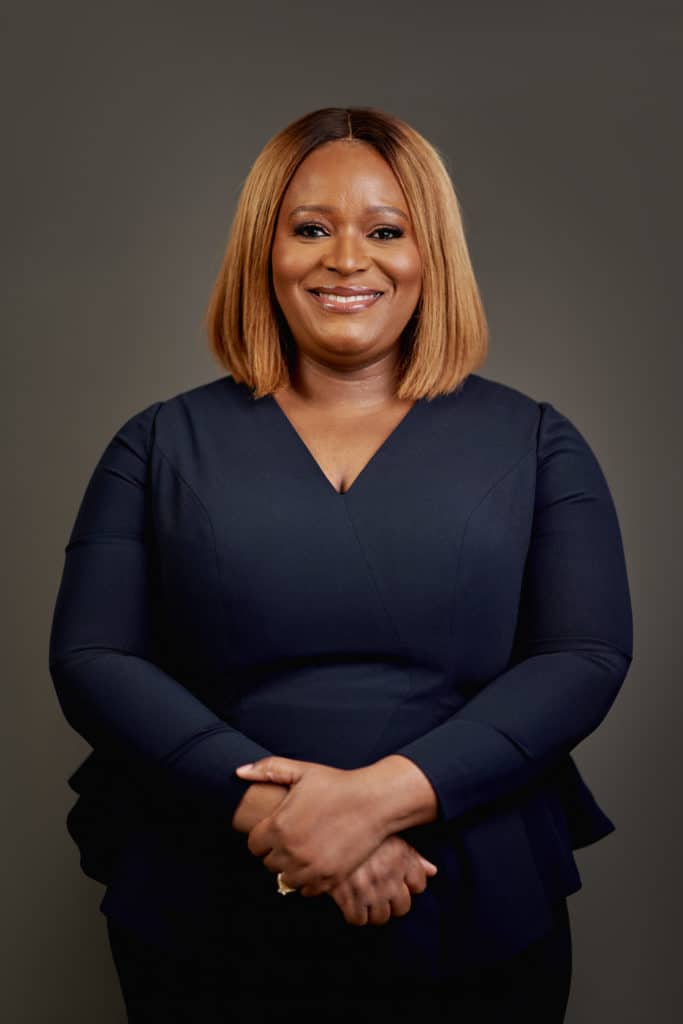
For an entrepreneur, the beginning of a journey often starts with solving a problem. It’s no different for Temie Giwa-Tubosun, who started LifeBank after reading an article on maternal mortality in
Africa in general, but the core focus was Nigeria.
“I think that is the best representation [as to] why LifeBank was started,” Giwa-Tubosun tells FORBES AFRICA.
Recognized with a Schwab Foundation Social Innovation Award at the 2024 World Economic Forum Annual Meeting in Davos, Switzerland, LifeBank’s entire mission focuses on ensuring that as a healthcare tech- nology and logistics company, it facilitates the transmission of blood from laboratories to patients and doctors in hospitals.
Operating in three different markets – Nigeria, Kenya, and Ethiopia – Giwa-Tubosun says that the plan is for LifeBank to become more pan- African than it already is.
“For Africa to contribute to global innovation and a global financial system, for Africa to take its rightful place, its people have to be in good health,” she says.
“And for us, my vision is for LifeBank to be at the forefront of that. “That requires us to innovate. It requires us to have a very tight distribution system. It requires us to focus on quality and to make sure that we’re serving our communities across all of the markets where we operate. And for us, it’s really key to ensure that Africa is in good health because, for us, that is the foundation of Africa taking its rightful place in the global policy world.”
Brown’s Food Company
Kenya • Founded: 1979
Commercial Director: Delia Stirling
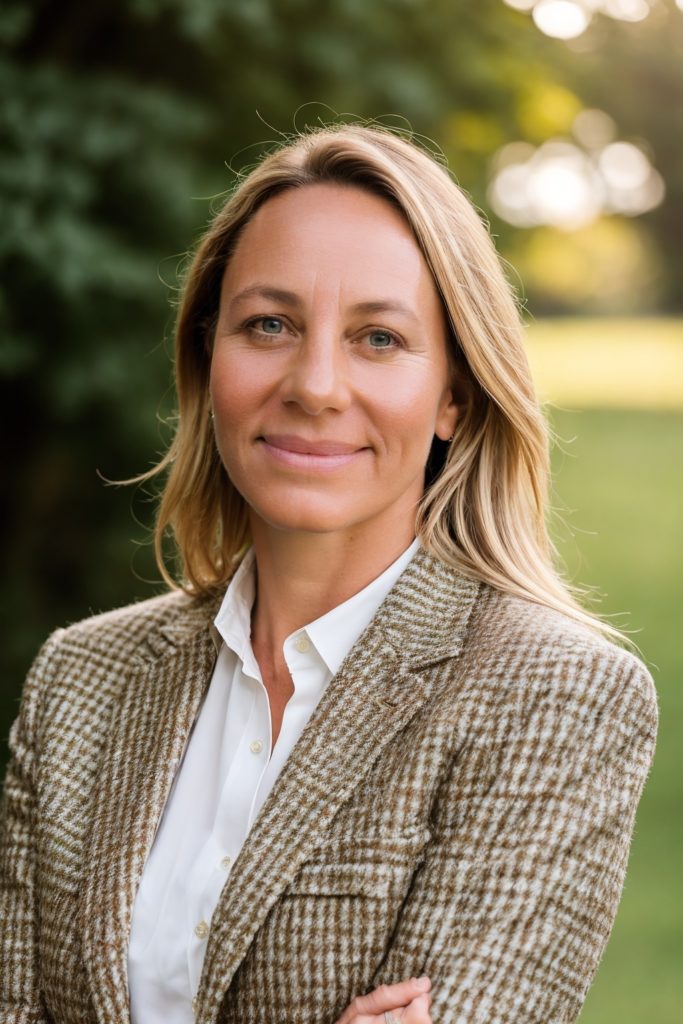
David and Sue Brown started Brown’s Food in the 1970s as a cheese business and it quickly became a pioneer in the in- dustry. The goal of the company has always been to make “healthy, delicious, and natural foods” in Kenya.
As a second-generation owner, spearheading a well-known food company would come with a lot of pressure, but for Delia Stirling, it’s an honor.
“[My parents] started making cheese for themselves, just for the love of it,” Stirling says. “And people started showing up trying to buy the cheese. So, we started essentially because of that love for food… and it’s continued very much with that passion and enjoy- ment of food.”
As a food manufacturer that sources raw ingredients from smallholder farmers and processes them into “nutritious high-value food products”, each item has a key purpose – to ensure that both sides of the ecosystem, the farmer and the consumer, benefit.
“With an entry point of innovative food processing, we work at both ends of the value chain; directly impacting farmers, the soil, and consumers in tandem,” Stirling adds.
“When we are designing our product range, each ingredient is selected to play a specific and com- bined role in ensuring human and planetary health. Products intentionally have a long ingredients list to promote dietary diversity easily and conveniently.”
Plato
South Africa • Founded: 2019
Co-founders: Stephan and Petrus Bredell
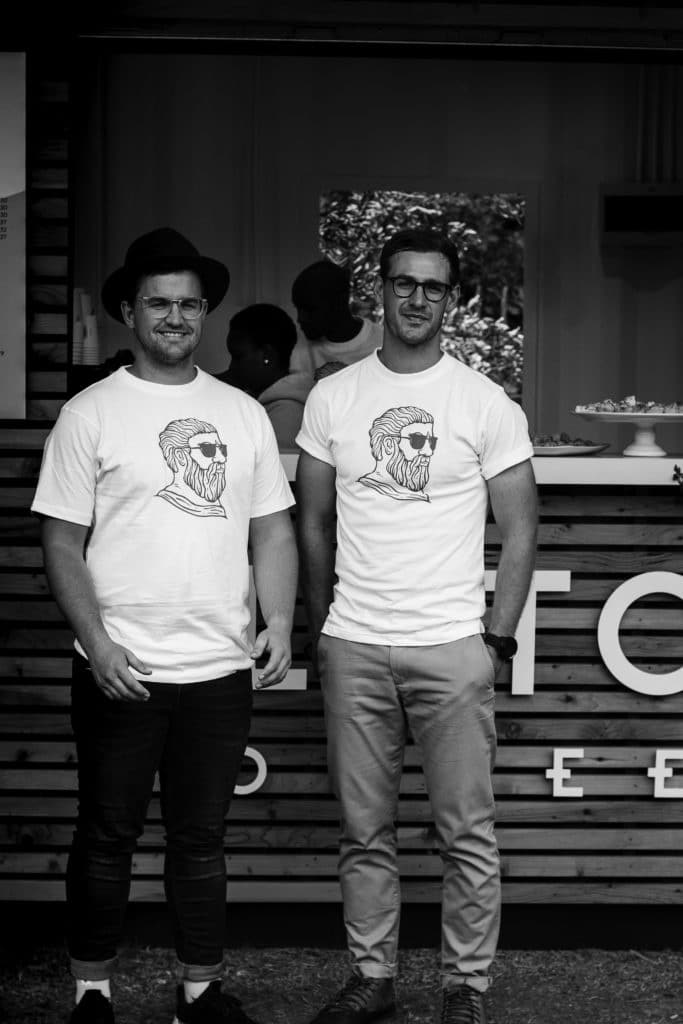
South Africa’s coffee culture is well-established and consum- ers are spoilt for choice by both local and international brands. This, however, didn’t deter Plato founders, Stephan(left, in picture) and Petrus Bredell.
They opened their first shop at Irene in South Africa’s Gauteng province; 2021 to 2023 were big years for the coffee brand as they opened more stores and started franchising. They are now in over 50 locations, including joint ventures, franchises and pop-up stores.
“I make sure the brand is lekker (good) and we create nice spaces and experiences. I always tell people I want to create the iStore of coffee shops. So when you walk into an iStore, whether you’re an Apple fan or not, it is aspirational – it feels clean and is like very minimal,” Stephan says. “We started with a design and user experience-approach first. And then I told my boet (brother), ‘listen, make sure the coffee is good’.”
Stephan says they plan to open 90 shops by the end of the year, and plan to be on 150 by the end of next year, and are looking at expansion in the U.K., U.S. and the United Arab Emirates.
Another important aspect of the business is staff; they work one full day and are off the next. It’s the same with alternate weekends.
“We encourage them to study etcetera on their off days and spend time with family and friends. You don’t really get time off in the hospitality industry, so we wanted to give our baristas time to rest so they are at their best when engaging with customers and also have a life outside of being a barista,” Stephan explains. “Humans are humans; treat others as you would like to be treated, right?”
Urwibutso Enterprise
Rwanda • Founded: 1983
Founder and Managing Director: Sina Gerard
Urwibutso Enterprise is a food processing company in Rwanda, founded by social entrepreneur, Sina Gerard. The company and Gerard are as well-known for their corporate social responsibility initiatives as they are for their food products, one of which is the supremely popular Akabanga Chili Oil.
Having been in operation for over four decades now, the company’s core values include integrity within commitment, innovation and reliability.
In a previous interview with FORBES AFRICA, Gerard stated that young people rebuilding Rwanda should not be afraid to share ideas and add value to Africa’s raw materials.
“Do not just grow strawber- ries to sell them at the market. Make jam, juice, yogurt and cosmetics. This way, more can be charged for the finished product and more profit can be made.
This profit can then be used as additional capital for the business and to provide a better life for all involved,” he said at the time.
Aside from establishing a thriving business, located in Nyirangarama in Rwanda’s Rulindo District, in 2007, Gerard founded College Fondation Sina Gerard, which comprises a nursery, primary and secondary schools, and a vocational training center, further emphasizing his commitment to helping the next generation of pioneers.
Dune Foods (Manna Health; MannaBrew)
South Africa • Founded: 2018
Co-founders: Brandt and Aam Coetzee
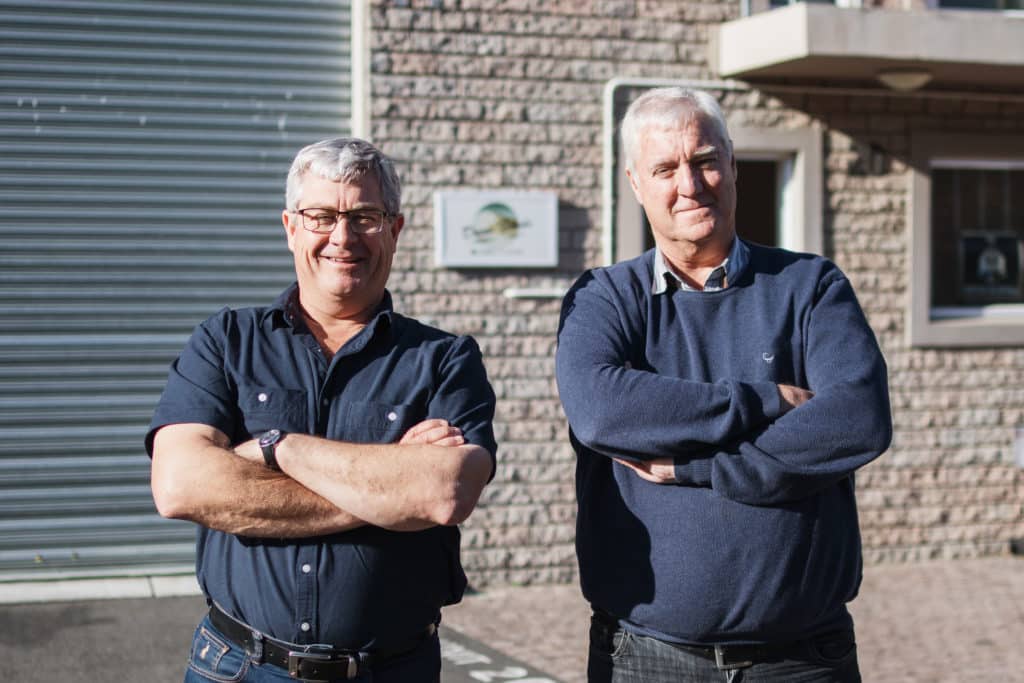
Many residents of Prieska and other small towns in South Africa’s Northern Cape province saw the invasive thorn trees, known as Mesquite (Prosopis glandu`losa), as troublesome; brothers Brandt (left, in picture) and Aam Coetzee saw them as an opportunity.
Brandt’s journey actually dates back to 1996, during the days of the ‘Working for Water’ program in South Africa. His task was to clean invasive alien plants.
“I went to the head office, met the guys in charge, said ‘I would like to do some research for them regarding secondary industries’, for this ‘Working for Water’ program… and that’s where it all started. We didn’t concentrate on the seedpods at that stage,” says Brandt.
After starting a woodworking factory, employing the wood from the Mesquite trees, Coetzee real- ized that the business wasn’t sustainable, as the small, woody bushes of the tree remained, bearing a number of the seedpods.
“In 2005, the same time our research was done on the Mesquite seedpods, we started with Manna Blood Sugar Support for diabetics.”
Today, Dune Foods includes Manna Health, which supplies natural remedies, and MannaBrew, a superfood brew that uses the seedpods of the Mesquite tree, slow-roasted to enhance the rich, smooth, caramel, nutty flavors and enjoyed like any other coffee.
“We are still very small but as this product grows internationally – because we are already export- ing to the U.S., to Australia and to the UAE – the bigger the market becomes, the more permanent jobs we create.
“We believe it’s a win-win for everybody. It’s a win for nature, it’s a win for the people that are har- vesting the product, even the farmers, and then all the service providers in between; and the end user benefits a lot from the product because of the health benefits of the product,” adds Brandt.
Woodstock Gin and 5Pence
South Africa • Founded: 2014
Founder: Simon von Witt
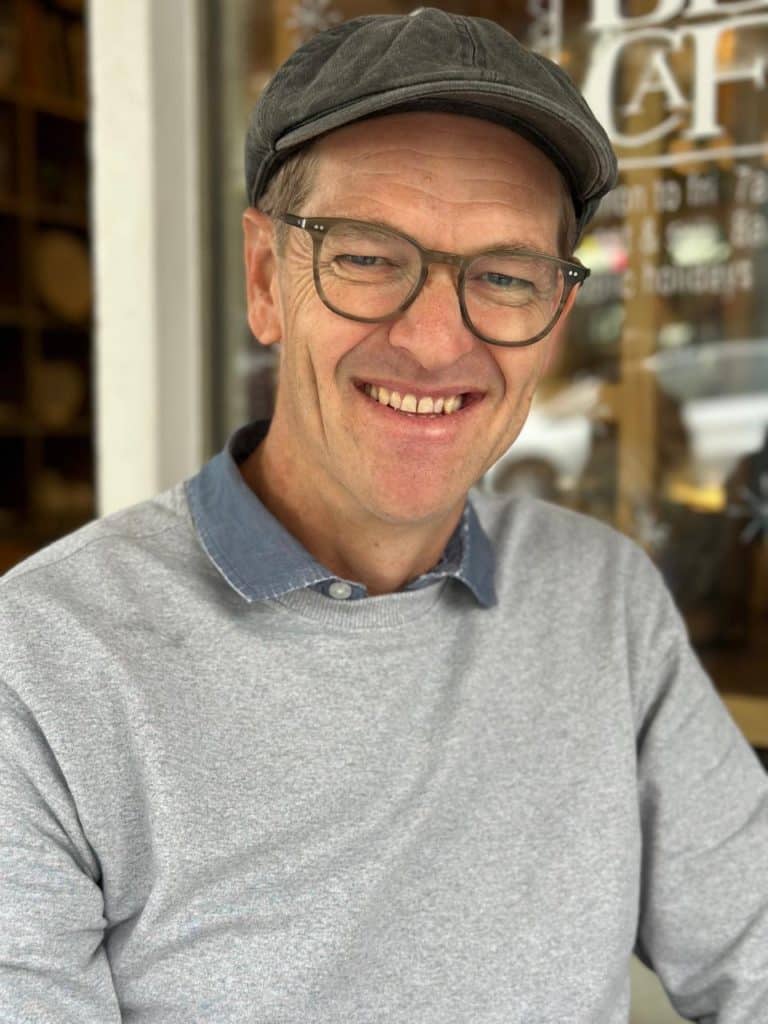
Simon von Witt’s journey into entrepreneurship began as a hobby.
Initially working as an environmental manager in the engineering sector, Von Witt recalls a particular holiday in Europe when he got to enjoy some of the finest liqueurs and grappa.
“When I came back to South Africa, I continued with my normal environmental management work,” Von Witt says. “And I just started playing around with different recipes [that] I got from friends over there. [It was something I did] on weekends, and it was just a fun hobby. Eventually, people said ‘well, why don’t you take it to market and see how it goes?’ I did that and the winter market started selling pretty well.”
According to an Edward Snell & Co report, in 2018/19, vodka overtook brandy in value, and in June 2020, gin sales exceeded vodka and are now 3% higher. This makes gin the second-largest spirit category in South Africa.
Von Witt believes that although there is a great amount of competition in the food and beverages industry, particularly the alcohol category, for him, success is about taking risks and not being afraid of strategy.
“I think one of the biggest lessons I’ve learned is teaming up with the right people, getting the right partners on board from the start and having a good route to market.”
Melvin Marsh International
Kenya • Founded: 1995
Founder and CEO: Flora Mutahi
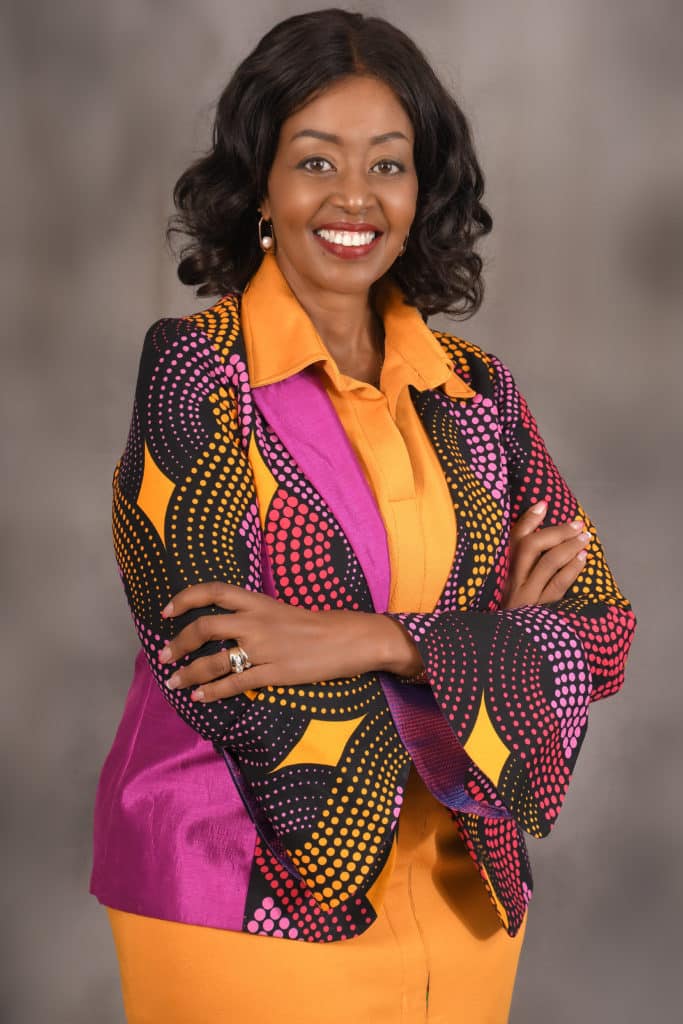
Flora Mutahi’s “labor of love” was birthed after a long day trying to figure out the route she wanted to take as a businesswoman in the 1990s. She had already been repri- manded by her family for taking the unconventional path “only built for men”. With those around her not taking her seriously, all Mutahi wanted was a cup of tea… with ginger. But she was out of ginger and instantly thought about the possibilities of ginger- flavored tea rather than making it using individual ingredients.
“What sets us apart is that our products are 100% natural,” Mu- tahi says today of her tea brand.
“A lot of my competitors use chemicals in their products. Also, I’m constantly seeking out my consumers and their needs.”
Another motivation for estab- lishing Melvin Marsh stemmed from a “deep-seated concern” that, like many other African nations, Kenya exported the vast majority of its agricultural and natural products in bulk —and tea was no exception.
“Shockingly, then, over 97% of our teas were shipped out glob- ally in bulk, robbing us [of ] the critical opportunities to value-add and much-needed revenues – a significant economic loss for us but also a loss of our identity.
It’s disheartening to see our tea rebranded,” she adds.
“Having dedicated 28 years to the tea packaging industry in Kenya, my vision has always been to transform this narrative by going global, ensuring that the world recognizes and values Kenyan tea for its true origin and exceptional quality as the best tea in the world!”
SeamlessHR
Nigeria • Founded: 2018
Founders: Dr Emmanuel Okeleji and Deji Lana

SeamlessHR, an all-in-one platform, is transforming HR operations. What sets it apart is its focus on addressing the unique challenges faced by businesses on the African continent.
“We offer functionalities that other solutions lack, such as tailored payroll, performance management, and local integrations like Embedded Finance, empowering employers to enhance the quality of life for their employees,” says Emmanuel Okeleji, co-founder and CEO.
“By digitizing HR processes and incorporating artificial intelligence, we enable our customers to make better decisions and increase productivity. Moreover, our platform provides invaluable data insights that help businesses across Africa improve workforce management and decision-making.”
Another point the company prides itself on is prioritizing user experience and customization.
“We listen to our customers and continually innovate to meet their evolving needs,” Okeleji says, adding, “Our mantra, ‘Built For Africa by the Africans’, drives our focus on customer satisfaction, while our investment in R&D ensures that our platform remains at the cutting-edge of technology.”
SPARK Schools
South Africa • Founded: 2012
Co-founder and CEO: Stacey Brewer

South Africa’s Department of Higher Education and Training’s March 2024 fact sheet shows that the percentages of employed people who had upper- secondary education (44.7%); upper-secondary, non-tertiary education (55.4%) and tertiary (75.3%) educational qualifications remained significantly lower than the averages for the Organisation for Economic Co-operation and Development (OECD) countries and several others.
Part of SPARK Schools’ vision is for South Africa to be at the forefront of global education. Taking the “bold move” to start a school, co-founder Stacey Brewer says that she wanted to address the education crisis in the country.
With over 15,000 scholars across 26 network schools in the country’s Gauteng and Western Cape provinces, the approach and model Brewer has taken is to ensure that the learning gap between students can be closed.
“We would like to serve as many communities as possible, whether it’s [in] the townships or suburban areas, it doesn’t really matter. We do not screen on academic ability, because we believe that every child from every community can achieve [anything], so it does not matter if they could be starting with us in grade eight but reading at a grade four level,” says Brewer.
“We have to break new ground and inspire others to do more. And to get involved, it’s not going to take one player to do this. There’s a huge amount of work that we have to do.”
Skyewise Group
Nigeria • Founded: 2015
Founder: Elvis Abuyere
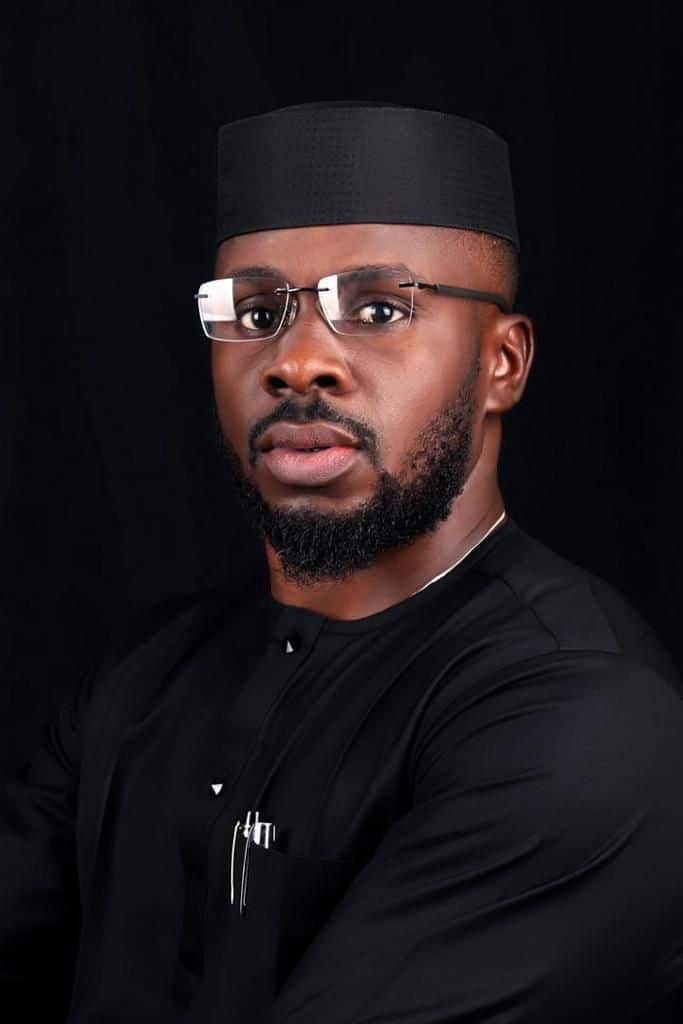
Skyewise Group was first registered as a travel and tour company in 2013… but began full operations in 2015, and swiftly evolved into a conglomerate within eight years,” says founder Elvis Abuyere.
The group diversified its portfolio, establishing entities such as the Skyewise Cooperative Society, Skyewise Automobile Investment Services Ltd, and Skyewise Global Investment Services Ltd.
“Environmental responsibility is integral to our ethos,” asserts Abuyere.
“All our offices utilize solar inverter energies.”
The company’s impact extends beyond financial empowerment, with initiatives like the Skyewise Empowerment and Advancement Foundation (SEAF) that champions youth entrepreneurship and education.
“In 2020, having achieved a prominent industry position and driven by a desire to give back to society, we established our non- governmental organization, the Skyewise Empowerment and Advancement Foundation (SEAF). It focuses on empowering young entrepreneurs by exposing them to business opportunities and providing capacity and skill- building programs,” says Abuyere.
“In the same year, our foundation impacted lives through its quarterly ‘SEAF Impact Them Young Program’, granted funds to businesses, conducted memorable outreach events, hosted periodic entrepreneurship and mentorship symposiums, and subsequently introduced the phenomenal ‘Meet the CEOs’ – an annual summit where industry-leading business owners and innovative minds advancing the entrepreneurship dream in Africa share their success stories, inspiring the younger generation aspiring to become CEOs and create value through entrepreneurship for national development.”
Abuyere adds, “Our vision is not just to succeed, but to empower others to succeed alongside us.”
REEL Gardening
South Africa • Founded: 2010
Founder and CEO: Claire Blanckenberg
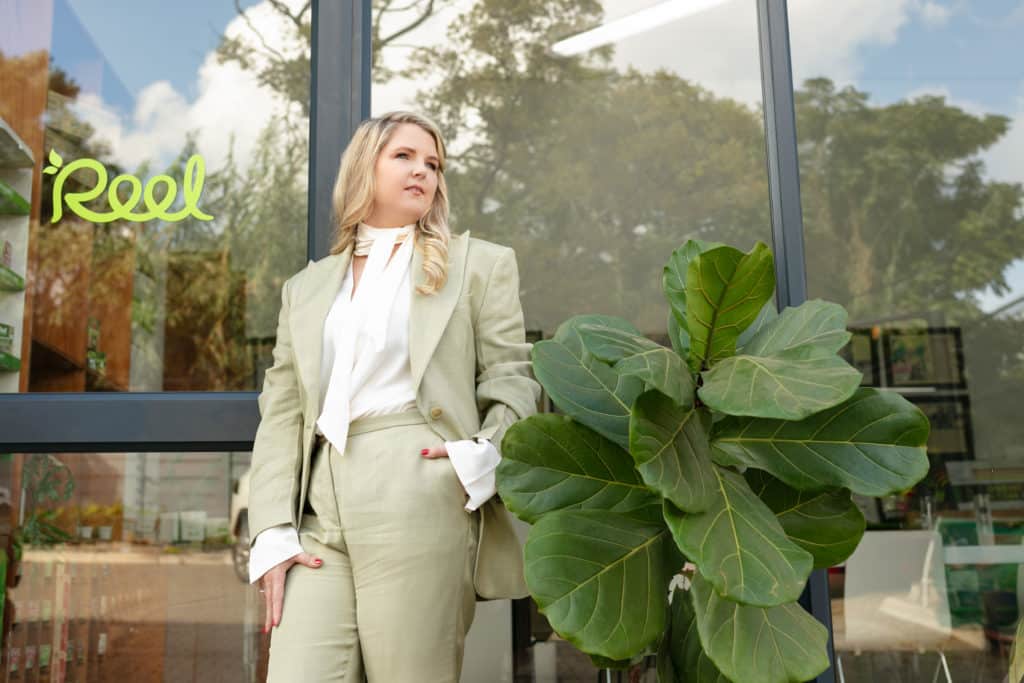
At the age of 16, Claire Blanckenberg found her- self sitting in her vegetable garden with a tape measure on her lap and centimeter marks drawn on her fingers. She wanted to sell vegetables to her parents to make extra pocket money.
Frustrated by seed and fertilizer wastage and the challenges planting at the right depth and distance, she sought a simple, effective solution that would be accessible to all, regardless of how much one knew about gardening.
Years later, her company, Reel Gardening, has revolutionized home gardening and food security in South Africa, through its innovative, embedded seed tape system.
“Sustainability is at the core of everything we do,” Blanckenberg says.
“We want to continue to simplify product ranges and simplify the way in which we can enable people to grow food, focusing on doing more, with less re- use of materials and water. [In] the end, grow more food with less space and less water.”
As a businesswoman, Blanckenberg keeps women at the forefront of all her decision-making. Women often encounter unique obstacles when starting and growing businesses, and, for her, it’s about provid- ing an environment where women can potentially become entrepreneurs. “Being an entrepreneur is amazing. It enables you to create the work environment you want and it enables you to help other women in the space, to become bold women. This is a space where you become seen.”
Tashas Group
South Africa • Founded: 2005
Founder and CEO: Natasha Sideris
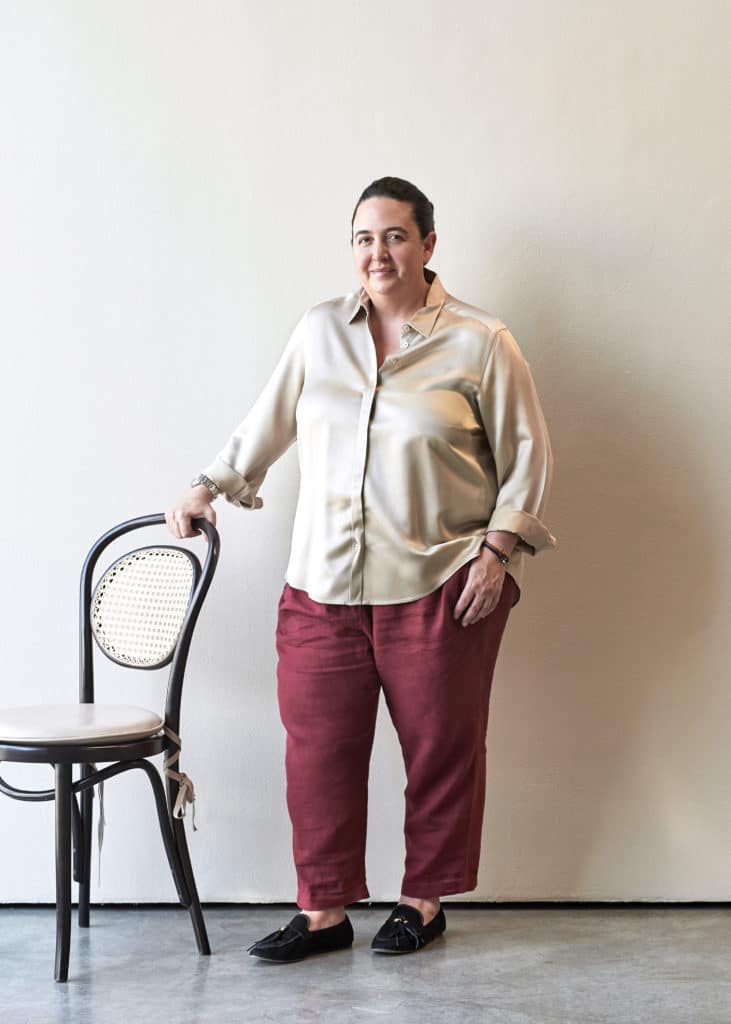
As a third-generation hospitality professional, Tashas Group founder Natasha Sideris recalls growing up
watching her father, a restaurateur, perfect his craft. She studied psychology at univer- sity, but returned to her true passion – food and hospitality.
The profitability of the sector is noteworthy, with revenue in the food service market in South Africa reported as approximately ZAR585.1 billion ($32 billion) in 2023 alone. There is enough scope for growth, even beyond South Africa’s borders.Though she began with opening a single restaurant that “set out to challenge the norm”, the Tashas Group today has grown to 35 locations including in South Africa, the UAE, Saudi Arabia and London in the U.K.
Recently, Sideris’ work as a woman in the male-dominated sector was recognized by the University of South Africa, which awarded her an honorary degree of Doctor of Philosophy in Management Studies.
Ellen Davis Interior
Ghana • Founded: 2019
Founder: Belle Yemofio

When I set out to establish EllenDavis Interior Design, I did my market analysis to understand the competitive environment,” shares Belle Yemofio, founder and Creative Director of EllenDavis Interior Design. “I realized that to be different, I needed to find an unmet need of clients by competitors; to understand what they value and how to deliver that value at the right cost.”
The company’s early milestones were marked by a personal touch and dollops of determination. From door-to-door marketing to leveraging the power of referrals, EllenDavis Interior Design quickly gained traction in the market.
“Our first client was very satisfied with our work and gave us more projects to work on,” recalls Yemofio. “Securing these initial projects and delivering exceptional results helped us build credibility in the market.”
One of the firm’s distinguishing factors is its integration of local culture and materials into its designs.
“We make it a point to use local materials for sustainability purposes in each of our projects,” Yemofio emphasizes. From locally-woven baskets to handcrafted furniture, the company celebrates heritage while delivering spaces that resonate with its clients.
As demand surged, Yemofio recognized the need for expansion. “Starting as a one-person operation was great, but I needed more hands,” she explains. The recruitment of a talented team and the adoption of internet marketing techniques propelled the company to new heights.
Looking ahead, the company has ambitious goals to further its impact. “We aspire to become a thought leader, serving as a resource for interior design education.”
NEWFORM Foods
South Africa • Founded: 2020
Founder and CEO: Brett Thompson and Tasneem Karodia

If one had said a decade ago that you could eat meat from an animal without killing it, you’d probably think it was a hoax. Food-tech and biotech has made the seemingly impossible, possible. And it’s in this space that founders Brett Thompson and Tasneem Karodia have thrived.
“We were the first in Africa to look at this technology called cultivated meat or cellular agriculture,” Thompson says. “We were like ‘let’s do it first – make African meat’. And I think it was a great thing to do because we got a name out but we also thought the technology that we’ve developed doesn’t have a border.”
So, what is cultivated meat?
“We take a selection of cells harmlessly from an animal – we’ve taken cells, and we do the cell lines from lamb, beef and pork. Essentially, what we’re trying to do is create a stable cell line that keeps producing; it’s ultimately what we do at scale as a brewery,” says Thompson.
As co-founders, they reminisce the journey of Newform Foods (formerly Mzansi Meat). “I told Tas not to quit her day job and she didn’t listen,” Thompson says, instantly making Karodia laugh.
“I was looking to move into this space and was doing a lot of research,” Karodia explains. “There were no jobs for my particular skill set. Everyone was looking for a scientist and I am not a scien-tist… and Brett was willing to take me.”
Capitalizing on the demand in countries like China and the U.K., Thompson and Karodia wanted to develop technology that could be ap-plied for any country around the world.
“The industry is only 11 years old,” Karodia says. “And that means it’s quite difficult to get people to interact with our products. And so, I think, through luck, people find what we’re doing quite interesting
WISOLAR • South Africa, Nigeria
Founded: 2016
Founder and CEO: Tonye Irims

Tonye Irims founded WiSolar, an on-demand prepaid solar utility, in 2016. It focuses primarily on a power purchase agreement (PPA) business model. WiSolar installs and maintains the solar infrastructure in customer homes, and then sells that power to the customer via the app as required per kWh – this could be for a 10- or 15-year term. According to the company, this business model allows property own- ers to install solar at no upfront cost.
When he first came upon the idea, Ir- ims set out to understand and learn more about solar technology. He also took a few trips overseas to find suppliers and de- termine how the company could connect mobile payments to solar electricity.
“When we started, it was kind of a dif- ficult time to sell solar to people because, first of all, people didn’t believe that solar electricity was the same as grid electric- ity – they felt that there was a difference in the electricity, so we had to explain to them [that] it’s the same thing, it’s just a different source,” he says.
Irims created packages to make it easier for the customers to understand.
The on-demand solar electricity platform is currently available in South Africa and Nigeria, however, the com- pany has plans to enter Zimbabwe, Rwanda, Tanzania, and the DRC in the future.
Irims advises future entrepre- neurs: “It’s really a very difficult path. It’s not a sprint, it’s a long run. If you want quick wins, I don’t think entrepreneurship is for you… unless you’re ready to make a sacrifice, you’re ready to put in the discipline, and the consistency. And you also need to stay innova- tive as an entrepreneur – you need to actually look ahead. So, if you’re ready to sacrifice, ready to play the long game, it’s for you.”
Easy Solar
Sierra Leone • Founded: 2016
Co-founders: Nthabiseng Mosia, Alexandre Tourre and Eric Silverman

“We can’t talk about industrial or commercial development, you can’t talk about high quality of life, in a residential sense as well, without power,” explains Easy Solar’s Chief Commercial Officer, Nthabiseng Mosia (pictured). Along with her co- founders Alexandre Tourre and Eric Silverman, Mosia set out on a mission to find solutions to Africa’s energy concerns.
Easy Solar offers a range of products, including solar lanterns, home lighting systems, appliances and cooking stoves on affordable financing plans.
“I was born in Ghana, raised in South Africa; my parents are from both countries, but I grew up mainly in Johannesburg. Around the time I was in high school, loadshedding happened. It was the first time I really experienced what a lack of power can mean. And when you don’t have access to something, it becomes
quite visceral, to see all the things that it does enable,” Mosia says. “I went to graduate school in the U.S. – I was focusing on energy degrees or energy resource management – to try and answer the question of how do we really fix Africa’s energy problems?”
Easy Solar has offices in Sierra Leone and Liberia and is focused on making energy affordable and accessible for all. “We started the company with a mission to light up lives. At the time, Sierra Leone had about 95% of the population without access to electricity, which is quite significant compared to other parts of the continent. It seemed like the right market opportunity to really try and do a pilot. And the rest is history,” she says.
“Seeing the first community that we electrified and virtually everyone in that pilot community now has solar… the impact of people switching on that light bulb for the first time, because I think first access is such a powerful thing; those are the things that stay with me.”
Loading...
